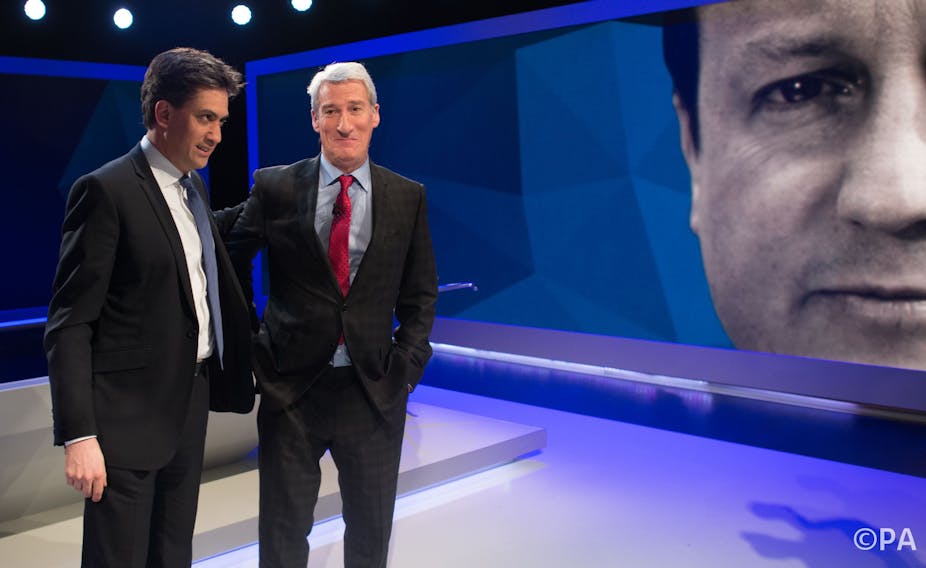Given that his personal ratings have been so low, and behind those of the Labour party in general, the only way was up for Ed Miliband in his first major TV appearance of the election campaign.
The Conservatives were reluctant to have Miliband in a direct debate with David Cameron because it might boost his credibility as a prime ministerial candidate, so Miliband found himself questioned alone by Jeremy Paxman and a studio audience on Sky and Channel 4. This came directly after Cameron had run the same gauntlet.
As it turned out, Miliband is generally agreed to have exceeded expectations. Admittedly, the YouGov opinion poll issued immediately after the broadcast had Cameron ahead by 51% to 49% and ICM put the margin at 54% to 46%. But given the gap between them in personal ratings and the fact that David Cameron has the authority of a prime minister, Labour can be relatively encouraged by these results.
On social media, David Cameron does not seem to have done as well as would be expected of a prime minister. Miliband came away with a higher proportion of tweets rating his performance positively.

Miliband’s set out a vision of a fairer and more equal Britain with some passion – and that was his biggest strength in this appearance. He made it clear that he wants to move on from the New Labour view of inequality – which was, for him, too relaxed. He wants to get tough on poverty rather than just leaving the rich to get wealthier, like New Labour.
He also turned the tables on Jeremy Paxman, winning studio applause when he warned the abrasive interviewer not to make assumptions about the election result so early in the campaign, telling him: “you are important, but not that important”.
He was on less strong ground when Paxman pressed him on whether he thought there was a natural limit on migration into the UK. Blue Labour supporters and those in the north of England are concerned that Labour is vulnerable to UKIP on this issue. A focus group organised by YouGov for The Times thought that Cameron was more convincing when talking about immigration.
Miliband acknowledged that New Labour had taken too light a touch on banking regulation, but argued that the size of the debt when they left office was due to the global financial crisis rather than mismanagement. He also conceded that the Millennium Dome was not a good use of public money.
But he failed to address something important that his party has never dealt with. This is the charge that by expanding spending after 2001 they eroded what was a projected budget surplus that could be set aside for a rainy day.
Asked by Paxman whether he was a North London geek, he replied “who cares?” The trouble is that some voters might. Given a list of ten positive and negative attributes about each party leader, a YouGov survey saw respondents select out of his depth, weak and weird in relation to Miliband.
More television successes might help to counteract this impression. His “Hell yes, I’m tough enough” response to Paxman’s questions about his fitness for the job of prime minister has already been picked up in the media as a central message from the programme.
One should never exaggerate the effect that these television discussions have. Nick Clegg came away from the 2010 debate with glowing reviews but was not able to translate his success into seats and votes.
Miliband’s relative success in this first appearance may boost the morale of Labour activists and that, in turn, would help in the all-important ground war. Whether it will move the polls away from a virtual dead heat remains to be seen, but I doubt it.

